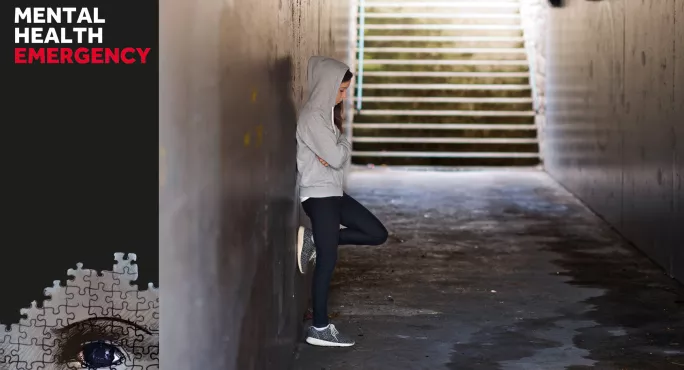- Home
- Exclusive: Schools’ mental health crisis ‘out of control’
Exclusive: Schools’ mental health crisis ‘out of control’

Mental ill health is “out of control” among young people, Tes has been told, with one school having experienced four suicide attempts among its students since last summer.
Yesterday, as part of its Mental Health Emergency series, Tes lifted the lid on the country’s buckling children and adolescent mental health services (CAMHS). Today, we look at how the emergency is impacting schools.
Tes has spoken to a head - who asked not to be named to preserve the anonymity of her pupils - who described in shocking detail how the current crisis is unfolding at her school:
- Four students, ranging from Year 8 to Year 11, had attempted suicide since last summer. Fortunately, all survived.
- In each of the three cases that have occurred this academic year, the students were back in school a few days after the attempt, but with no new psychiatric support.
- The school put the students on the waiting list for children and adolescent mental health services (CAMHS) - but the head felt the long and labyrinthine process meant the “entire system is made for failing”.
- Thresholds for CAMHS have risen to the point where “these days, if you’ve got a child that’s self-harming - and it is just self-harming, they’re not trying to take their life - they are so far down the list of priorities”.
- Students faced disturbing online threats, including a Year 7 pupil “who has got an online friend who keeps telling him to hurt himself”.
- The school tries to support the students who made the suicide attempts, but knows it lacks the necessary expertise. “I’ve got no one trained for that sort of level…That’s proper crisis care.”
- Wellbeing staff are overwhelmed with demand: “They’re just so busy - I could employ another 10 and they’d be all busy by the end of next week.”
- There are no information sharing protocols with the NHS, so the school only finds out about a suicide attempt if the family decides to inform them.
- The situation is the worst the head has seen in her 25-year career, and “it’s getting worse and worse”.
The account provides a snapshot of the challenge posed to teachers and school leaders by stretched NHS services and deteriorating mental health.
Feature: One head’s battle against the mental health crisis
Comment: The state of CAMHS is a national disgrace
Exclusive: Self-harming pupils turned away four times in CAMHS crisis
However, the school’s experience is not an isolated case. Natasha Devon, a mental health expert and Tes columnist, said that “under any empirical measure” young people’s mental health “has got worse”.
Ms Devon pointed to cutbacks to staff and services which help nip mental health problems in the bud. “There are so many other things that schools have lost to austerity…educational psychologists, teaching assistants, school counsellors,” she said.
“The evidence shows that the earlier you catch a mental health difficulty, the easier it is to manage.”
She said that squeezed school budgets meant that sport and the arts had “suffered”. “Sport and art have an acknowledged therapeutic value in maintaining good mental health…[Pupils] don’t have those same self-expressive outlets.”
Ms Devon said that the spate of suicide attempts experienced by the school in question was not “unusual”. One pupil’s attempt could affect students at crisis point, and “can be enough to push them over the edge”, she said.
Matt Blow, policy manager at the charity Young Minds, said that a prevalence survey published by the NHS last November showed that “there’s been an increase in the number of children and young people with a diagnosable mental health condition”.
While increased awareness about mental health is thought to have contributed to this, he said “the rise of social media” and an education system that “puts a lot of pressure on young people” was likely to have exacerbated the situation.
With surveys showing that children and parents are more likely to “reach out” to a teacher than a GP, Mr Blow said “schools really are on the frontline” of the mental health crisis.
He said there had been some “really welcome proposals” to tackle the situation, such as the NHS Long Term Plan, and the government’s Green Paper on children and young people’s mental health. But, he warned, “there’s a long way to go, there’s hundreds of thousands of young people at the moment that won’t get the support they need”.
Ms Devon said a solution to the crisis had to come “right from the top”.
“We need things like smaller class sizes, more teaching staff, TAs back in the classroom, funding for school counsellors, more access to sport and arts…A lot of it is reclaiming what we’ve lost.”
Keep reading for just £1 per month
You've reached your limit of free articles this month. Subscribe for £1 per month for three months and get:
- Unlimited access to all Tes magazine content
- Exclusive subscriber-only stories
- Award-winning email newsletters



